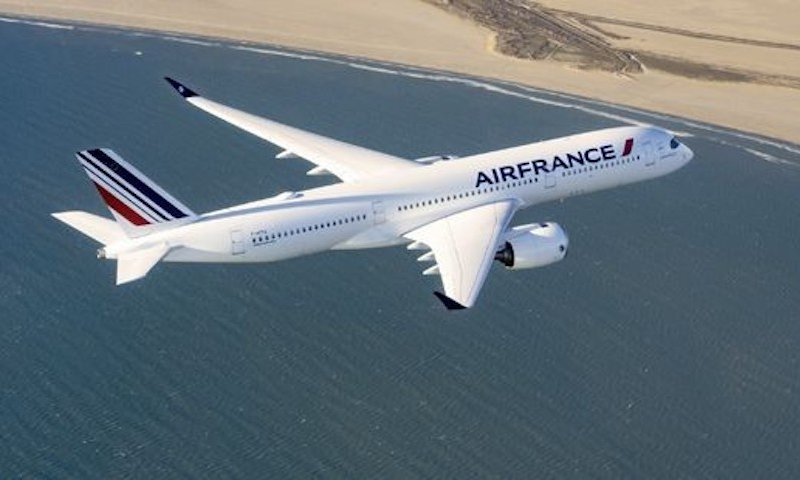
Air France-KLM, Total, Groupe ADP and Airbus have joined forces to carry out the first long-haul flight powered by Sustainable Aviation Fuel (SAF)1 produced in France. At 3:40 p.m. today, Air France Flight 342 took off from Paris-Charles de Gaulle airport’s Terminal 2E for Montreal with its tanks filled for the first time with sustainable aviation fuel produced in Total’s French plants.
This flight is a tangible result of the four groups’ shared ambition to decarbonize air transportation and to develop a SAF supply chain in France, prerequisite to the generalization of their use in French airports.
No modifications to storage and distribution infrastructure, aircraft or engines are required to incorporate biofuels. Their gradual introduction worldwide should significantly reduce CO2 emissions from air transportation, in line with the United Nations’ Sustainable Development Goals.
The biofuel used for this flight was made from waste and residue sourced from the circular economy. Total produced the SAF from used cooking oil at its La Mède biorefinery in southern France and at its Oudalle factory near Le Havre, without using any virgin plant-based oil.
This first 100% French SAF received ISCC-EU certification from the International Sustainability & Carbon Certification System, an independent organization that guarantees sustainability. The 16% blend on this flight lessened its CO2 emissions by 20 tons.
By developing and supporting France’s first industrial SAF production, Air France-KLM, Total, ADP Group and Airbus are paving the way for France to drive innovation in the energy and environmental transition. French legislation calls for aircraft to use at least 1% SAF by 2022 for all flights originating in France, ahead of the European ambition scheduled to gradually ramp up to 2% by 2025 and 5% by 2030, as part of the European Green Deal.
To meet these requirements, Total will also produce SAF at its Grandpuits zero-crude complex near Paris as from 2024.
Today’s flight also illustrates the synergy of the different drivers for shrinking aviation’s environmental footprint, i.e., sustainable aviation fuel, latest-generation aircraft and electrification of ground operations. The Airbus A350 used for the flight consumes 25% less fuel than its predecessor. What’s more, the aircraft was serviced by the first 100% pure-electric refueling truck, developed in France with Total expertise, and all of the ground support equipment used by Air France was fully electric powered.
Air France-KLM is a pioneer in testing sustainable aviation fuels. KLM made its first SAF-powered flight in 2009. Since then, the Group has multiplied the number of innovative programs. Between 2014 and 2016, for example, it carried out 78 Air France flights powered by a 10% SAF blend in collaboration with a Total affiliate. These tests showed that the use of SAF had no impact on the reliability of airline operations. Air France-KLM intends to strengthen its leadership in SAF in the years ahead, while contributing to research on future generations of aircraft.
In addition to this flight, Airbus is conducting several series of tests to certify airliners to fly with 100% SAF in the coming decades. Airbus has also installed SAF refueling stations at its industrial facilities so it can be used in production operations, as well as for aircraft deliveries. These installations contribute to Airbus’s ambition to decarbonize all of its industrial operations.
For this first flight, Benjamin Smith, CEO of Air France-KLM, stated: “For many years, the Air France-KLM Group has been committed to reducing its environmental footprint. Together with the renewal of our fleet, sustainable aviation fuels constitute our main lever in the medium-term for reducing our CO2 emissions per passenger/km by half by 2030. These two actions are therefore central to our strategy, alongside eco-piloting and achieving carbon-neutral ground operations. France currently has the opportunity to position itself as a leader in the production and use of sustainable fuels and we are doing everything possible to contribute to this with our partners. Supporting the emergence of an economically viable French aviation biofuel sector for all the parties involved is a strategic priority for the country and the group.”
Patrick Pouyanné, Chairman and Chief Executive Officer of Total, declared: “The development of biofuels is part of Total’s broad-energy strategy for decarbonizing the transportation industry. After successfully launching production of sustainable aviation fuels at our facilities in France last March, we are continuing to adapt our industrial facilities to prepare for the growing demand from the aviation industry in the coming decade. By directly reducing the carbon intensity of the energy products used by our aviation industry customers, we are actively working with them to achieve our ambition to get to net zero by 2050, together with society.”
Augustin de Romanet, Chairman and CEO of Groupe ADP, added: “This first flight from Paris-Charles de Gaulle airport is a symbol of our ambition to decarbonize air transport by integrating new sustainable air fuels into aircraft. The European air transport roadmap aims for zero net emissions by 2050, and we are keen, as an airport operator, to support this energy transition and to embark, without delay, on the path of transforming our operation process and infrastructure.”
And Guillaume Faury, CEO of Airbus added: “Sustainable fuels are a major lever for achieving our objectives of decarbonizing the aviation sector, and Airbus supports all initiatives that contribute to their development and use on commercial flights. Coordinated action by all stakeholders is needed to increase the share of these sustainable fuels, which can be used today on up to 50% of our aircrafts, without any modification or operational impact, thereby reducing their environmental footprint.”
1Sustainable aviation fuel (SAF) is a blend of conventional aviation fuel (JET-A1) and biojet fuel made from waste and residue sourced from the circular economy (animal fat, used cooking oil, etc.). Biojet fuel has similar properties to JET-A1 and produces up to 90% fewer CO2 emissions over its lifecycle compared with the fossil equivalent.
Source: Petroleum Africa
Join our mailing list here


